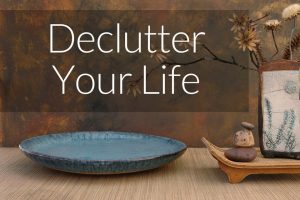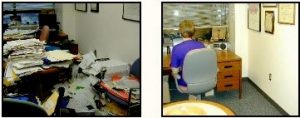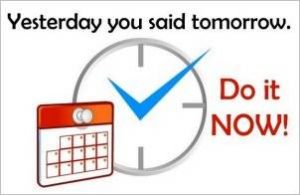Do you crave peace and tranquility in your life? There’s great freedom in letting go of the things that are pulling you down and draining your energy. The fourth week in March is National Clutter Awareness Week – a great time to declutter your life!
Here’s a short quiz to help you determine if you’d benefit from investing a little time to declutter and get organized:
- Do you dread spending time in your home or office environment?
- Does your current environment make it difficult for you to focus on what’s most important?
- Does it take you more than 15 seconds to find what you need when you need it?
- Do others in your home or office have difficulty quickly finding what they need when they need it?
- Do you frequently feel overwhelmed by all of your stuff?
- Do you feel overwhelmed with digital clutter when you log onto your computer or tablet or when you check email?
- Do you feel overwhelmed with all the sticky notes on your brain?
According to Dr. Joseph Ferrari, a professor of psychology at DePaul University, “Clutter is an overabundance of possessions that collectively create chaotic and disorderly living spaces.”
A close cousin to clutter is procrastination. Because sorting through and tossing or giving away items is a task that many people find unpleasant, they tend to put it off.
“Clutter is postponed decisions.” -Barbara Hemphill
Decluttering and Getting Organized

If you have a desire to declutter your life and you’re having a hard time getting started, it may help to better understand what’s holding you back. Here are some common stumbling blocks – and some suggested solutions — for decluttering and getting organized.
I don’t know where to begin.
Begin with the end in mind and visualize what you would like to have instead of what you have right now. If the space you want to organize was already the way you want it to be, what would it look and feel like? What would you be able to do in that space that you cannot do now?  What wouldn’t you have to do that you must do now?
What wouldn’t you have to do that you must do now?
An example of this is a cluttered office with a completely full file cabinet that does not allow space for incoming documents. If you decluttered — including getting rid obsolete documents in your file cabinet — one thing you could do (that you cannot do now) is to have room to file new documents instead of piling them up on top of the file cabinet.
Keep reading to find out what to do next.
I don’t know how to go about sorting and deciding.
SORT into these categories:
- Store in this space
- Store in another space
- Toss (garbage, recycle, shred)
- Give to someone else
- Take action (do something with it)
“Clutter: anything you own, possess, or do that does not enhance your life on a regular basis.” -Kathy Paauw
My definition of clutter goes far beyond your physical environment. Clutter can be activities, thoughts, or even relationships that do not enhance your life. For now, we’ll focus on the clutter in your physical environment.
DECIDE what to do with each item by asking yourself these questions:
- What’s the worst thing that could happen if I got rid of this?
- By the time I might need it, will it be obsolete?
- Does it need to be repaired or altered in order for it to be useful? If yes, when will I do that?
- If I got rid of it and decided that I needed it later, could I fairly easily replace it?
- If my home/office burned down, would I actually miss this item enough that I’d try to replace it?
- Does it have tax or legal implications that require me to keep it?
- How will it enhance my life to keep this?
I don’t have enough time to get organized.
 You may never find the time, but if it’s a priority, you’ll make the time. If getting organized feels too overwhelming to deal with, break it into smaller tasks and carve out time on your schedule to eat the elephant, one bite at a time. For example, if you are organizing an office, schedule time to sort through your most current pile of papers on your desk. Keep scheduling work sessions for yourself until all the piles are gone. When finished with your desk, move onto another area of your office.
You may never find the time, but if it’s a priority, you’ll make the time. If getting organized feels too overwhelming to deal with, break it into smaller tasks and carve out time on your schedule to eat the elephant, one bite at a time. For example, if you are organizing an office, schedule time to sort through your most current pile of papers on your desk. Keep scheduling work sessions for yourself until all the piles are gone. When finished with your desk, move onto another area of your office.
Also, consider the time and financial cost of not getting organized. You have two choices. You can waste time looking for things and spend unnecessary money to buy things you already have but cannot find…or you can invest some up-front time to get organized so you can focus your time, energy and resources on what’s most important.
If you don’t have the discipline to do this by yourself, ask someone to help you.
I don’t have enough space for everything.
As with time, how you use your space is a matter of priorities. If you have too many things and not enough space, you have several options:
- Use your space more effectively by employing creative storage methods.
 I helped a client reorganized the office pictured here and we created a filing system that enabled her to find anything she filed or stored in 5 seconds or less.
I helped a client reorganized the office pictured here and we created a filing system that enabled her to find anything she filed or stored in 5 seconds or less.
- Let go of some things that don’t enhance your life to keep.
- Move to a larger space. Before doing this, ask yourself if you really need more space, or if you need less stuff. In most cases, more space does not solve the problem, because you’ll find ways to fill a bigger space over time, and you’ll still want more space.
- Rent off-site storage. This option can be costly, and often people put things in storage and never look at it again. This is a good short-term option when you are in between moves or when you need some time to pass before you can deal with decision-making. For example, if a family member just died and you are not emotionally ready to let go of some of their belongings, store them and plan to make decisions when you’ve worked through the grief and shock that comes with such a loss. I suggest putting a note on your calendar to revisit the storage unit in six months.
I might need this someday.

There are tangible and intangible costs to keeping things. Does the cost (time, space, money, stress, etc.) of keeping something outweigh the benefit of holding onto it? Revisit the questions above to help you make good decisions.
I’ll do it next week.
 Procrastination is what created the piles of indecision in the first place. Commit to doing something NOW, even if you just spend five minutes a day to work on getting organized.
Procrastination is what created the piles of indecision in the first place. Commit to doing something NOW, even if you just spend five minutes a day to work on getting organized.
I feel guilty because I paid good money for this and have never used it.
The fact that you once paid for it does not change the fact that you have never used it. The better question to ask is whether or not you see it being useful to you in the future. Ask yourself why you have not used it, and determine if this is something that is enough of a priority that you will change your future behavior and start using it.
If there’s a learning curve required to educate yourself on how to use it, are you committed to investing the time to learn? Or perhaps you’ve never used it because the reason (need) for buying it does not exist anymore and someone else could put it to better use.
If you want to speed up your success rate to eliminate clutter and get organized, let’s schedule a no-cost discovery call. I’ll help you get started.
Additional Resources:
- Blog: Declutter Your Life
- Blog: Clutter Burped!
- Blog: Downsize and Organize Your Digital Clutter
- Blog: What Does Clutter Cost You?
- Blog: How to Declutter Any Space
- Blog: Hidden Clutter
- Blog: Managing the Sticky Notes of Life
- Guide: Dealing with Procrastination
- Guide: A Disorganized Procrastinator’s Guide to Time Management & Getting Organized
- Free Webinar: Buried in Paper
- Free Webinar: Find Anything in 5 Seconds or Less
- Free Calculator: Cost of Disorganization Calculator











This article came at a perfect time for me! I struggle with the fear of needing to keep things, “just in case…”, but have overwhelm in place of joy and stress in place of peace. I’m excited and grateful for the practical tips given. Feeling motivated!
Angela, you can do it! Ask yourself what the worst thing is that could happen if you got rid of something and discovered that you needed it at some point in the future. If you can live with the worst thing, it may be worth the joy and peace to let it go. Also consider that so many things become obsolete, or you cannot find it when you need it because of all the other “stuff” you’re keeping. Letting go is so freeing! I’d love for you to report back about how your decluttering is going!